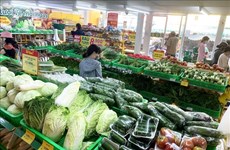Vietnam, Cambodia hasten land border demarcation
The Special Vietnam-Cambodia Working Group will meet in early November to exactly locate four border markers in the field in Dak Lak-Mondulkiri and Tay Nay-Svay Rieng pair provinces.
 The meeting of the Presidents of the Vietnam – Cambodia Joint Committee on Land Border Demarcation and Marker Planting (Source: VNA)
The meeting of the Presidents of the Vietnam – Cambodia Joint Committee on Land Border Demarcation and Marker Planting (Source: VNA)This was consented during a meeting of the Presidents of the Vietnam – Cambodia Joint Committee on Land Border Demarcation and Marker Planting which took place in Ho Chi Minh City from October 18-20.
The Vietnamese delegation to the event was led by Deputy Foreign Minister Le Hoai Trung, who is also Chairman of the National Boundary Commission, while the Cambodian delegation has headed by Var Kim Hong, Cambodian Senior Minister in charge of border issues.
At the meeting, the two sides displayed their resolve to quickly complete the border demarcation and marker planting as 83 percent of the work has been done in accordance with the Border Demarcation Treaty signed in 1985 and the Supplementary Treaty to the 1985 Treaty inked in 2005.
They informed each other about their plans on planting auxiliary border markers and stakes, and pledged to join hands for the best results.
The two sides discussed measures to speed up the delineation of the remaining border sections in line with international law and reality, agreeing to invite international consultants to help with the work.
They also touched upon land exchanges under the models applied by the several relevant provinces of the two countries.
At the same time, the two countries will work to hasten the construction of a new bridge to replace the Dak Dang bridge in an effort to step up exchanges and economic links between their localities.
Regarding border management, they committed to strengthening the coordination between their localities and sectors on the basis of the reached agreements in order to maintain the friendly exchanges and mutually beneficial cooperation between their border residents.-VNA













